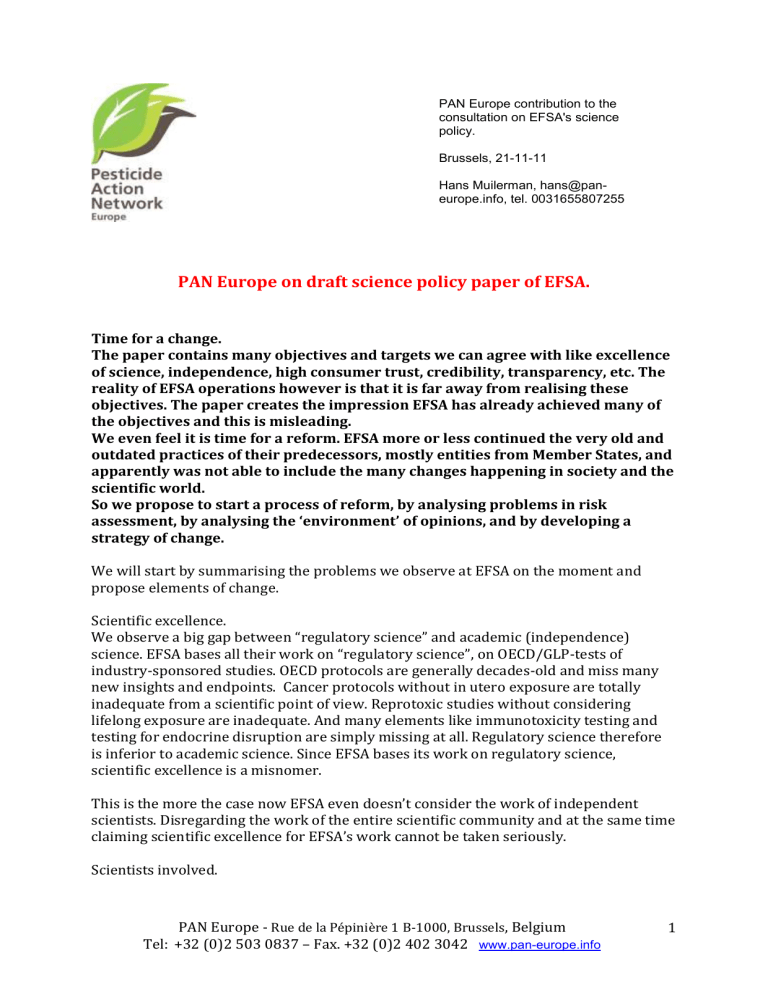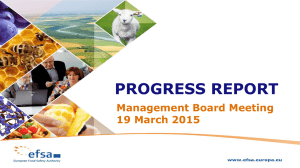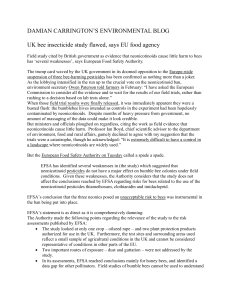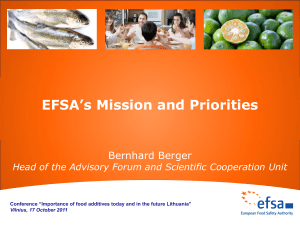PAN Europe contribution to EFSA consultation science policy

PAN Europe contribution to the consultation on EFSA's science policy.
Brussels, 21-11-11
Hans Muilerman, hans@paneurope.info, tel. 0031655807255
PAN Europe on draft science policy paper of EFSA.
Time for a change.
The paper contains many objectives and targets we can agree with like excellence of science, independence, high consumer trust, credibility, transparency, etc. The reality of EFSA operations however is that it is far away from realising these objectives. The paper creates the impression EFSA has already achieved many of the objectives and this is misleading.
We even feel it is time for a reform. EFSA more or less continued the very old and outdated practices of their predecessors, mostly entities from Member States, and apparently was not able to include the many changes happening in society and the scientific world.
So we propose to start a process of reform, by analysing problems in risk assessment, by analysing the ‘environment’ of opinions, and by developing a strategy of change.
We will start by summarising the problems we observe at EFSA on the moment and propose elements of change.
Scientific excellence.
We observe a big gap between “regulatory science” and academic (independence) science. EFSA bases all their work on “regulatory science”, on OECD/GLP-tests of industry-sponsored studies. OECD protocols are generally decades-old and miss many new insights and endpoints. Cancer protocols without in utero exposure are totally inadequate from a scientific point of view. Reprotoxic studies without considering lifelong exposure are inadequate. And many elements like immunotoxicity testing and testing for endocrine disruption are simply missing at all. Regulatory science therefore is inferior to academic science. Since EFSA bases its work on regulatory science, scientific excellence is a misnomer.
This is the more the case now EFSA even doesn’t consider the work of independent scientists. Disregarding the work of the entire scientific community and at the same time claiming scientific excellence for EFSA’s work cannot be taken seriously.
Scientists involved.
PAN Europe - Rue de la Pépinière 1 B-1000, Brussels , Belgium
Tel: +32 (0)2 503 0837 – Fax. +32 (0)2 402 3042 www.pan-europe.info
1
EFSA has a big problem getting top-class scientists on board of its panels. The panels are now populated by many national civil servants/regulators and only a few scientists.
Especially top-class scientists of different fields of toxicology like endocrinology, brain research, genetics, cancer are lacking. The few toxicologists present are general toxicologists and not specialists in the field. EFSA staff even has no toxicologists at all.
EFSA pretends to do “peer-reviews” with its panels but since “peers” are lacking as we showed above, a peer-review in fact is not possible. This could also be the reason behind the reluctance of the panels to take independent science into account, it is too specialistic.
The scientific level of the panel members is inadequate and this is a major challenge for the much needed change at EFSA.
Independence.
EFSA started in a situation when it was quite normal for risk assessors to closely cooperate with industry and to exclude everyone else from being involved. This attitude is still partly present at EFSA. Organising closed meetings with industry lobby club ILSI
(2006 Colloquium on risk assessment of genotoxic substances, 2009 Colloquium on cumulative risk assessment) was a big mistake. Allowing industry people access to panels (RA on guidance for birds, etc.) excluding other stakeholders, was another grave mistake. Adopting industry proposals in EFSA opinions (higher tier methodology like
HARAP, CLASSIC, TTC) further adds to the unbalanced operations of EFSA. The close relations of EFSA with industry should be put to an end and industry treated just like any other stakeholder.
The credibility of EFSA is at stake and will not be restored until it distances itself from industry.
Consumer trust of EFSA is low – only 13% of people are very confident in EFSA- and
EFSA is trusted less than scientists, NGO’s and health professionals. Consumers have a very good feeling of what is real and what is propaganda, and for sure trust in EFSA will go down if a programme of change is not started.
Industry infiltration
Industry with its massive resources is able to lobby at every level and is trying to place industry supporters in panels and elsewhere. We cannot blame industry for doing so, it’s their mission, increasing profit. But we can blame EFSA for being so incredibly naïve (we assume it is naivety and not done on purpose) in allowing industry supporters into its ranks. The well-known cases of infiltration (ANS with 12 out of 20 industry-linked people; TTC working group similar to previous ILSI groups; GM panels etc.).
A full reform is the only way to restore trust in EFSA, prevent the continuing scandals at
EFSA, and win credibility.
Proposals:
Start a full transition to a science-based approach in EFSA at all levels with a new culture to place new independent scientific findings at the center of its
PAN Europe - Rue de la Pépinière 1 B-1000, Brussels , Belgium
Tel: +32 (0)2 503 0837 – Fax. +32 (0)2 402 3042 www.pan-europe.info
2
work and replace panels and working groups with people who want to support real science
To that end, scientists working in academic laboratories and publishing original studies in scientific journals should be involved in EFSA; this of course can only be achieved if these top-level scientists are paid for their work
Realising excellence in science can only be achieved if all panels and working groups consist of independent actively publishing scientists
In the road towards achieving this goal, as a first step the Scientific Committee should consist of only independent toxicologists with different specialities, endocrinology, cancer, brain research, genetics, etc.
Additionally as a first step all other panels and working groups should have at least two toxicologists, both with no tie whatsoever with industry
All EFSA guidances developed in the last years under heavy industry influence or participation of industry (guidance on data requirements, on genotoxicity, and all guidances on higher tier risk assessment) should be revised with urgency in accordance with the above rules
Without any delay all people in panels with any non-trivial financial tie to industry (worked for industry, connections to industry-dominated organisations or industry lobby clubs (ILSI, ECETOC, SETAC, etc.) should be removed.
Industry-sponsored studies should be put to an end and replaced by industrypaid (levy) tests performed blind in an independent laboratory.
PAN Europe - Rue de la Pépinière 1 B-1000, Brussels , Belgium
Tel: +32 (0)2 503 0837 – Fax. +32 (0)2 402 3042 www.pan-europe.info
3
PAN Europe - Rue de la Pépinière 1 B-1000, Brussels , Belgium
Tel: +32 (0)2 503 0837 – Fax. +32 (0)2 402 3042 www.pan-europe.info
4


